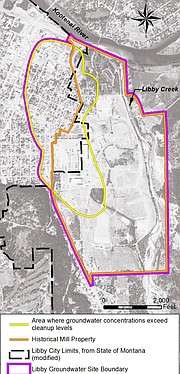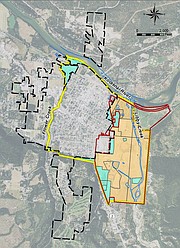EPA gives info on proposed CGA Agency addresses groundwater, Buy Well Plan
The EPA held an informational presentation about the new, larger, proposed Controlled Groundwater Area for the Libby Groundwater Superfund Site, Monday at a meeting in Libby.
Agency representatives explained the expansion of the Buy Well Plan and solutions for residents using a well as their sole source of water.
Andrew Schmidt, remedial project manager with the EPA, said the CGA boundary expansion is for everybody’s protection.
“We don’t want people exposed to wood treating chemicals,” he said.
The rationale for creating this CGA is because contaminated groundwater could potentially migrate to areas not covered by Libby’s ordinance banning the installation of wells and use of groundwater, he said. Expansions of the contaminated plume need to be prevented.
There are some residential areas, sandwiched between Lincoln County Port Authority property and the Libby city boundary, which would be added to the new CGA — as well as Port Authority-owned land east of Libby — he said.
When agencies made the original protection decisions regarding groundwater, they acknowledged the ordinance might need additional restrictions in the future, such as restrictions for fully preventing exposure to contaminants, he said.
The EPA came up with the new boundaries to cover the current contamination area, he said.
These boundaries cover where workers are treating soil on the surface, where wells might pull in contaminated plumes and where those wells potentially could expand the plumes, he said.
The EPA also considered a buffer zone when creating the new boundary, he said. They have done a lot of investigations and have a pretty good handle on how contaminants move.
“We don’t want the extent of the contamination to become larger,” he said. “We need to be doubly sure.”
Schmidt estimated a maximum of about 50 wells in the new CGA. Wells in the CGA would be offered the Buy Well Plan, he said.
At a Feb. 17 meeting of the Libby City Council, George Jamison, vice chair of the City-County Board of Health, addressed those 50 potential wells.
Jamison said that the number is an estimate based on the available data of property owners who could have drilled a well if they desired.
If such wells exist, they also could have been drilled for non-prohibited uses such as a closed-circuit system for a heat pump.
Without a thorough and exhaustive search across every affected acre of land, it is not possible to know the exact number of wells that exist or are in use — if any — within the proposed area.
In the Buy Well Plan, if residents in the CGA are not on city water, International Paper would offer to connect them to city water, Schmidt said. If residents have a well, International Paper would offer to plug and abandon the well or cap-and-lock the well.
If the well is a resident’s primary water supply or used for irrigation, International Paper would offer financial compensation to help offset the cost of having to pay for city water, he said.
Libby residents living without a well on their property, hooked up to city water, would not be affected by the CGA, he said. In the scenario where residents do have a well, residents can use the Buy Well Plan.
If a resident lives outside of the Libby city limits but within the CGA, they would not be able to install a well in the future, he said. If they have a well as their sole source of water, then the Buy Well Plan applies.
Libby residents with a well on their property exclusively used for irrigation can also apply for the plan, he said.
“You are not required to accept this offer,” he said. However, Schmidt encourages people to take advantage of the Buy Well Plan.
The main goal is to not have people exposed to a treating compound, he said. Preventing the exposure to groundwater has been a critical component in cleanup plans.
The prevention is called “institutional control,” he said. Basically, it insures no one is exposed to a treating compound and insures no one inadvertently causes a bigger problem.
The intent for the institutional control is to prevent anyone from being exposed to chemicals while the cleanup is happening, he said.
“We’re required to ensure the protection of human health,” he said.
The CGA will not impact groundwater site cleanup progress, he said. Additionally, the CGA proposal will not affect the well-banning city ordinance — an ordinance which cannot end until all the contaminated groundwater is cleaned up.
Kathy Olsen, with the Montana Department of Natural Resources and Conservation, suggested that if people have questions regarding what wells on their property may be limited to or what is needed to expand, to call her.
Water rights are “not cut and dry” or “black and white,” she said. Olsen added, she would be happy to walk people through and help them with questions.
Residents can also send her a call regarding irrigation on port authority property, she said.
The CGA is “just a second layer of protection for the community,” she said.
Schmidt said the next step for the CGA proposal involves a local petitioner signing the CGA application package. If the CGA is approved, a hearing would be held in the Libby area.
Notices would be sent 30 days in advance to all water rights holders, all land owners, all licensed well drillers in the county as well as anyone else who would be affected.
The DNRC would hold the hearing and accept comments formally, he said. After, they would decide if the CGA is justified before implementing the CGA.
Slides explaining the proposed CGA can be found online, under the Libby Groundwater Superfund Site Documents tab at http://lincolncountymt.us/lincoln-county-board-of-health.









